 Since 2007, J.H. Snider has been the president of iSolon.org and editor of The State Constitutional Convention Clearinghouse while also intermittently serving as a fellow at various institutions.
Since 2007, J.H. Snider has been the president of iSolon.org and editor of The State Constitutional Convention Clearinghouse while also intermittently serving as a fellow at various institutions.
During the 2012-2013 academic year, he was a Lab Fellow at Harvard University’s Edmond J. Safra Center for Ethics. During the 2011-2012 academic year, he was a Network Fellow at Harvard University’s Edmond J. Safra Center for Ethics. In 2008, he was a fellow at the Harvard Kennedy School of Government’s Shorenstein Center on the Press, Politics and Public Policy (since renamed the Shorenstein Center on Media, Politics and Public Policy). From 2007-2011, he was an affiliated researcher at Columbia University’s Institute for Tele-Information.

From 2001 to 2007, he was a Markle Technology Policy Fellow, Senior Research Fellow, Research Director, and National Fellow at New America. New America is a non-partisan, non-profit, public policy institute headquartered in Washington, DC. The purpose of New America’s fellows program, where Snider was one of its first national fellows, has been to be “a home for a new generation of public intellectuals committed to breaking the ideological mold and injecting new, big ideas into the public conversation about America’s future.” While a fellow, he published Speak Softly and Carry a Big Stick: How Local TV Broadcasters Exert Political Power.
From 1999-2000, he was an American Political Science Association Congressional Fellow in Communications and Public Policy, where he worked on the personal staff of U.S. Senator Ron Wyden and on the Judiciary Committee minority staff of U.S. Senator Patrick Leahy. He has also served as a University Fellow in the Department of Political Science at Northwestern University, and a Non-Profit Management Fellow and Senior Research Assistant at the Harvard Business School.
He has published dozens of think tank working papers and scholarly articles, hundreds of op-eds, and two books. His recent op-eds on periodic state constitutional convention referendums have been compiled in The State Con-Con Papers.
He has a Ph.D. in American Government (with a specialty in political communications) from Northwestern University, an M.B.A. from the Harvard Business School (where he focused non-profit management), and an undergraduate degree in Social Studies from Harvard College.
He has had extensive experience in local politics. In 2010, he led the campaign in Maryland to educate the public on the November 2, 2010 referendum to convene a state constitutional referendum. The referendum received 54.4% of the vote.
During 2010-2011, he served as Chair of Anne Arundel County’s Countywide Citizen Advisory Committee, constituted by representatives from the citizen advisory committee members in the County’s 121 public schools. The Anne Arundel County, Maryland, public school system is one of the fifty largest in the U.S.
In the early 1990s, he served as the Chair of the Vermont Secretary of State’s Task Force on Information and Democracy and the Chair of the Vermont Chapter of Common Cause’s Research Committee. He was twice elected to the school board in Burlington, Vermont and won a primary election for the House of Delegates in Maryland.
Current Affiliations
Citizen Connect (Bridge Alliance)
Columbia Institute for Tele-Information (Columbia University)
Open The Government (Open The Government)
U.S. State Constitutions Network (Oxford University)
Archived iSolon Projects (2007-2013)
Next Generation Open Government Project
The purpose of the Next Generation Open Government Project was to employ new semantic web technologies to empower citizens, journalists, and other opinion leaders with better information that makes government more efficient and effective.
Next Generation Checks & Balances Project
The purpose of the Next Generation Checks & Balances Project was to improve the democratic checks & balances system through innovations such as redistricting juries, citizen assemblies, and other independent bodies.
Next Generation K12 Democracy Project
The purpose of the Next Generation K12 Democracy Project was to enhance the democratic processes of K12 schools, primarily by empowering citizens with better tools to hold the public schools democratically accountable.
Archived Publications & Media Cites (Before 2007)
Archived Coalition Letters (2008-2017)
Sign-ons Regarding Open Government Public Policy
